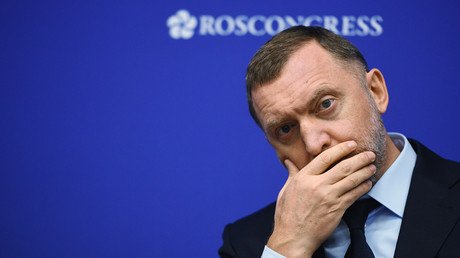Russian stocks claw back losses after Monday rout

Moscow-traded stocks and the Russian ruble rebounded on Tuesday after suffering their worst session in four years as a result of the US sanctions list expansion against Russian businessmen and companies.
The ruble-traded MICEX Index clawed back some ground, gaining 1.5 percent as of 13:18 Moscow time. The dollar-denominated RTS was down 1.5 percent. On Monday, it had dropped to the lowest level since September 2017.
The Russian currency, which weakened the most since February 2015, was down about 2 percent both to the dollar and the euro. The ruble was trading at 62 against the greenback and 77 against the common European currency.
Stocks of the Russian aluminum major RUSAL, which showed the biggest decline on Monday, were trading down more than 5 percent. The company, which was included in the US Treasury Department’s sanctions list, reported a possible technical default on certain types of debt obligations.
Meanwhile, the Central Bank of Russia (CBR) said on Tuesday it did not see any risks to the country’s financial stability. According to CBR head Elvira Nabiullina, the regulator has a wide range of tools it could apply to stabilize the financial system, but there are no corresponding risks.
Nabiullina pointed out that Russia is an open economy where many companies are export-oriented. Therefore, “the events that occurred have caused a correction in the market,” she said.
“As happens in such cases, at first there is increased volatility and uncertainty for investors, yet consequences are unclear. It takes time for the financial sphere and the economy to adapt,” Nabiullina explained.
She added that the floating ruble is one of the “shock absorbers.”
For more stories on economy & finance visit RT's business section















